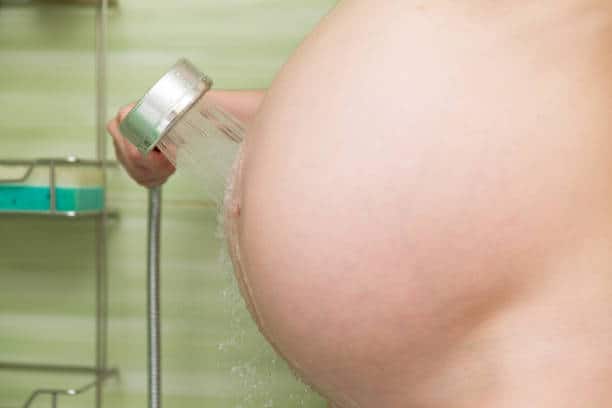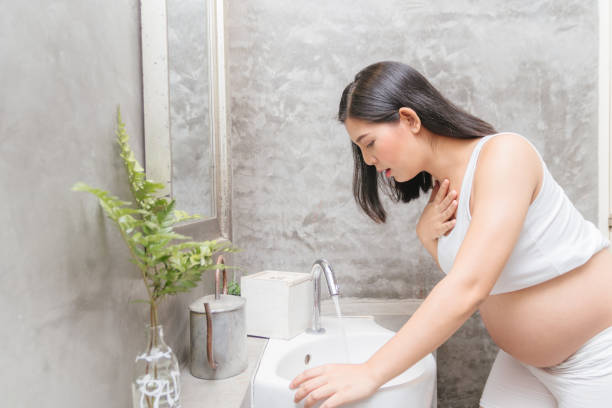Pregnancy is a time of great change in a woman’s body, and it can be challenging to navigate the many physical and emotional shifts that come with it. One common question that many expectant mothers have is whether it is safe to take hot showers during first trimester of pregnancy.
While hot showers can be a relaxing and soothing way to unwind, there are some important considerations to keep in mind when it comes to the impact of hot water on the body during this critical time.
During pregnancy, a woman’s body undergoes a number of changes that can impact her body temperature. In particular, the hormonal shifts that occur during the first trimester can make a woman feel warmer than usual.
This can be compounded by other factors such as increased blood flow and metabolic rate, which can cause the body to retain heat. As a result, some expectant mothers may find that they are more sensitive to hot water than they were before pregnancy.
While hot showers can be a great way to relax and unwind, they can also have an impact on the body during the first trimester of pregnancy. Hot water can cause the blood vessels to dilate, which can lead to a drop in blood pressure.
This can be particularly dangerous for expectant mothers, as it can reduce the flow of oxygen and nutrients to the developing fetus. Additionally, hot water can cause the body to lose fluids, which can lead to dehydration and other health complications.

1. Understanding Pregnancy and Body Temperature

During pregnancy, a woman’s body undergoes several changes, including an increase in body temperature. The core body temperature of a pregnant woman may rise slightly, but it should not exceed 38°C (100.4°F).
This increase in body temperature can be attributed to the hormonal changes that occur during pregnancy.
It is important to note that during the first trimester of pregnancy, the risk of birth defects is higher. Exposure to high body temperatures, such as those experienced in hot tubs or saunas, can increase the risk of birth defects.
Therefore, it is recommended that pregnant women avoid hot tubs, saunas, and other activities that may cause their body temperature to rise excessively.
Pregnant women should also be aware of the signs of overheating. These signs may include excessive sweating, dizziness, headache, nausea, and a rapid heartbeat.
If a pregnant woman experiences any of these symptoms, she should move to a cooler environment and drink plenty of fluids.
In addition to avoiding hot tubs and saunas, pregnant women should also take steps to regulate their body temperature. This may include wearing loose, breathable clothing, staying hydrated, and avoiding excessive physical activity in hot weather.
Overall, understanding the relationship between pregnancy and body temperature is important for ensuring the health and safety of both the mother and the developing fetus. By taking simple precautions and being aware of the signs of overheating, pregnant women can help protect themselves and their unborn child.
2. The Impact of Hot Showers in the First Trimester

During the first trimester of pregnancy, the fetus undergoes critical development stages, particularly the formation of the brain and spine. It is therefore essential for pregnant women to take extra care of their health and avoid anything that could potentially harm the fetus.
One of the concerns raised by many pregnant women is the impact of hot showers on the developing fetus. While hot showers may be relaxing and soothing, they can have adverse effects on the fetus, especially during the first trimester.
Research has shown that exposure to high temperatures, such as those found in hot showers, can increase the risk of neural tube defects, which can lead to serious complications in the baby’s brain and spine development.
Therefore, pregnant women are advised to avoid hot showers and instead opt for warm or lukewarm water temperatures. It is recommended to keep the water temperature below 100°F or 38°C to minimize the risk of harm to the fetus.
In addition to the risk of neural tube defects, hot showers can also cause dehydration and low blood pressure, which can be dangerous for both the mother and the developing fetus. It is therefore crucial to stay hydrated and avoid hot showers during the first trimester of pregnancy.
Overall, while hot showers may be tempting, pregnant women should prioritize the safety and health of their developing fetus by avoiding exposure to high temperatures. Opting for warm or lukewarm water temperatures can help minimize the risk of harm to the fetus and ensure a healthy pregnancy.
3. Risks of Hot Baths and Saunas

Hot baths, saunas, and hot tubs can be relaxing and enjoyable, but they can also pose risks for pregnant women, particularly in the first trimester. Exposure to high temperatures can lead to overheating, dehydration, and other complications.
Research has shown that exposure to high temperatures, such as those found in hot baths and saunas, can increase the risk of neural tube defects and other birth defects. Additionally, overheating can cause a decrease in blood pressure, which can be dangerous for both the mother and the developing fetus.
While taking a bath while pregnant can be safe, it is important to avoid hot baths and saunas during the first trimester. Pregnant women should also avoid hot tubs and saunas throughout their pregnancy, as the high temperatures can be harmful to the developing fetus.
If a pregnant woman does choose to take a bath during pregnancy, she should make sure the water temperature is no higher than 100 degrees Fahrenheit. It is also important to limit the amount of time spent in the bath and to avoid adding hot water while in the tub.
In summary, pregnant women should be cautious when it comes to exposure to high temperatures, including hot baths and saunas. It is important to stay hydrated, avoid overheating, and consult with a healthcare provider before engaging in any activities that may pose a risk to the developing fetus.
4. Potential Health Complications

Pregnancy is a time when a woman’s body undergoes significant changes, and it is important to take extra care to avoid potential health complications. Taking hot showers is a common practice, but it is important to be aware of the potential risks, especially during the first trimester of pregnancy.
Hot showers can increase the body’s temperature, which can be harmful to the developing fetus. High body temperature has been linked to neural tube defects, which can cause birth defects such as spina bifida.
Additionally, high body temperature can lead to dehydration, which can cause a range of complications, including preterm labor and low birth weight.
In addition to the risk of dehydration, hot showers can also increase the risk of infection. Warm and moist environments are ideal breeding grounds for bacteria, which can cause urinary tract infections.
These infections can be particularly dangerous during pregnancy, as they can lead to miscarriage and preterm labor.
It is important to note that not all hot showers are created equal. The risk of complications depends on the temperature and duration of the shower.
A short, warm shower is generally safe, but it is important to avoid prolonged exposure to hot water.
In summary, pregnant women should be cautious when taking hot showers, especially during the first trimester. High body temperature can increase the risk of complications such as neural tube defects, dehydration, infection, miscarriage, preterm labor, and low birth weight.
It is important to take short, warm showers and avoid prolonged exposure to hot water.
5. Precautions to Take

Pregnancy is a delicate time for women, and it is important to take extra precautions to ensure the safety of both the mother and the developing fetus. Taking hot showers during the first trimester can be a source of comfort for some women, but it is important to be cautious.
Excessive heat can be harmful to the developing fetus, especially during the first trimester when the baby’s organs are developing. Hot showers can raise the body temperature, which can lead to birth defects or miscarriage.
Pregnant women are advised to avoid hot tubs, saunas, and steam rooms for the same reason.
When it comes to taking a shower, it is recommended to use warm water instead of hot water. The water temperature should be below 100°F (37.8°C) to avoid overheating.
A good rule of thumb is to make sure the water temperature does not cause the skin to turn red.
It is also important to avoid exercising in hot and humid environments. Pregnant women should stay hydrated and avoid overheating during exercise.
Exercising in cool environments and drinking plenty of water is recommended.
In addition to taking precautions with the water temperature and exercise, pregnant women should also avoid taking warm baths. Warm baths can raise the body temperature and lead to overheating, which can be harmful to the developing fetus.
In summary, pregnant women should take extra precautions when taking hot showers during the first trimester. It is recommended to use warm water instead of hot water, avoid exercising in hot and humid environments, and avoid taking warm baths.
By taking these precautions, pregnant women can enjoy a safe and comfortable shower experience.
6. Effects on Pregnancy Symptoms

Hot showers are a common way for pregnant women to alleviate pregnancy symptoms such as morning sickness, fatigue, nausea, and fainting. However, it is important to understand the potential effects of hot showers on these symptoms.
Morning Sickness
Morning sickness is a common symptom experienced by many pregnant women during the first trimester. While hot showers may provide temporary relief, they can also exacerbate symptoms.
This is because hot showers can cause dehydration, which can make morning sickness worse. Pregnant women should ensure they drink plenty of water before and after taking a hot shower to avoid dehydration.
Fatigue
Fatigue is another common symptom experienced by pregnant women during the first trimester. While hot showers can help to relax the body and relieve stress, they can also increase fatigue.
This is because hot showers can cause a drop in blood pressure, which can make pregnant women feel lightheaded and tired. Pregnant women should take care when taking hot showers and ensure they have a support system in place in case they feel faint or dizzy.
Nausea
Nausea is another symptom commonly experienced by pregnant women during the first trimester. While hot showers can provide temporary relief, they can also exacerbate symptoms.
This is because hot showers can cause dehydration, which can make nausea worse. Pregnant women should ensure they drink plenty of water before and after taking a hot shower to avoid dehydration.
Fainting
Fainting is a potential risk associated with hot showers during pregnancy. This is because hot showers can cause a drop in blood pressure, which can make pregnant women feel lightheaded and dizzy.
Pregnant women should take care when taking hot showers and ensure they have a support system in place in case they feel faint or dizzy.
In conclusion, while hot showers can provide temporary relief for pregnancy symptoms, pregnant women should be aware of their potential effects. Pregnant women should ensure they drink plenty of water before and after taking a hot shower to avoid dehydration and take care when taking hot showers to avoid fainting.
8. The Role of Family Support

During the first trimester of pregnancy, many women experience morning sickness, fatigue, and other symptoms that can make it difficult to complete daily tasks. This is where family support can play a vital role in helping pregnant women cope with these challenges.
Family members can help by offering emotional support and encouragement, as well as practical assistance with household chores and errands. For example, a partner or family member can take over cooking and cleaning duties, allowing the pregnant woman to rest and conserve her energy.
It’s also important for family members to be understanding and patient with the pregnant woman, as her moods and needs may fluctuate during this time. Simple gestures like offering a glass of water or a snack can go a long way in making her feel cared for and supported.
In addition, family members can help the pregnant woman maintain a healthy lifestyle by encouraging her to eat well, exercise regularly, and get enough rest. They can also help her avoid harmful substances like alcohol and tobacco, as well as provide transportation to prenatal appointments.
Overall, the role of family support in the first trimester of pregnancy is crucial in helping women navigate the physical and emotional changes that come with this stage of life. By providing practical assistance, emotional support, and encouragement, family members can help ensure a healthy and happy pregnancy for both the mother and the baby.
9. Alternatives to Hot Showers

During the first trimester of pregnancy, it is recommended to avoid hot showers as they can increase the risk of birth defects and complications. However, there are several alternatives that pregnant women can try to relax and relieve muscle tension.
Warm Showers
Instead of taking hot showers, pregnant women can opt for warm showers. Warm water can help to soothe sore muscles and reduce stress without raising body temperature to dangerous levels.
It is important to keep the water temperature below 100°F (38°C) to prevent any harm to the developing fetus.
Epsom Salt Bath
Epsom salt baths are another alternative to hot showers that can help to relieve muscle pain and promote relaxation. Epsom salt contains magnesium, which is essential for muscle and nerve function.
Pregnant women can add a cup of Epsom salt to warm bath water and soak for 15-20 minutes. It is important to avoid using scented bath products as they can irritate the skin and cause allergic reactions.
Other Alternatives
In addition to warm showers and Epsom salt baths, pregnant women can try other relaxation techniques such as meditation, deep breathing, and prenatal yoga. These techniques can help to reduce stress and promote relaxation without raising body temperature.
Overall, pregnant women should avoid hot showers during the first trimester and opt for safer alternatives such as warm showers and Epsom salt baths. It is important to consult with a healthcare provider before trying any new relaxation techniques to ensure they are safe for both the mother and baby.
Latest News on the Subject

Recent studies have shown that taking hot showers during the first trimester of pregnancy may increase the risk of certain complications. The American College of Obstetricians and Gynecologists (ACOG) recommends that pregnant women avoid hot tubs, saunas, and hot baths because of the potential risks to the developing fetus.
According to a study published in the Journal of Reproductive Toxicology, exposure to high temperatures during the first trimester of pregnancy may increase the risk of neural tube defects, such as spina bifida. The study found that pregnant women who took hot showers or baths for more than 30 minutes per day had an increased risk of neural tube defects compared to those who did not.
However, it is important to note that not all studies have found a significant link between hot showers and birth defects. A study published in the Journal of Obstetrics and Gynaecology Canada found no association between hot water exposure and adverse pregnancy outcomes.
Despite conflicting evidence, it is generally recommended that pregnant women avoid hot showers and baths during the first trimester. If a woman feels the need to take a warm shower, she should keep the water temperature below 100°F and limit the duration to no more than 10-15 minutes.
It is also important to stay hydrated and avoid becoming overheated during pregnancy.
In summary, while the evidence regarding the safety of hot showers during pregnancy is conflicting, it is generally recommended that pregnant women avoid hot water exposure during the first trimester to reduce the risk of complications.
Related posts:
Frequently Asked Questions
What temperature should my shower be during pregnancy?
Pregnant women should avoid taking hot showers during their first trimester. The water temperature should be warm, but not hot, to avoid overheating the body. A good rule of thumb is to keep the water temperature below 100°F (38°C).
How often should I shower while pregnant?
There is no specific guideline on how often a pregnant woman should shower. However, it is recommended to shower at least once a day to maintain good hygiene. If you live in a hot and humid climate, you may need to shower more often to stay comfortable.
Is it safe to take a shower at night during pregnancy?
Yes, it is safe to take a shower at night during pregnancy. In fact, taking a warm shower before bedtime can help you relax and sleep better. Just make sure the water temperature is not too hot and avoid using harsh soaps that can dry out your skin.
Can hot showers cause harm to my baby during the first trimester?
Yes, taking hot showers during the first trimester can be harmful to the baby. High temperatures can cause overheating, which can lead to birth defects or miscarriage. It is best to avoid hot showers during this time and opt for warm water instead.
Is it safe to take hot showers while pregnant in the second trimester?
In the second trimester, the risk of birth defects and miscarriage decreases, but pregnant women should still avoid hot showers. High temperatures can cause dehydration and overheating, which can be harmful to the baby. It is best to stick to warm water during this time.
What are the risks of taking hot showers during pregnancy?
Taking hot showers during pregnancy can increase the risk of dehydration, overheating, and birth defects. It can also cause low blood pressure, which can lead to dizziness and fainting. Pregnant women should avoid hot showers and opt for warm water instead.

Iesha is a loving mother of 2 beautiful children. She’s an active parent who enjoys indoor and outdoor adventures with her family. Her mission is to share practical and realistic parenting advice to help the parenting community becoming stronger.
